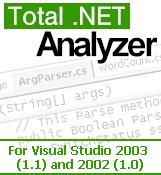 
Review: Analyze Your Code
Visual Studio Magazine, Leonard Lobel
8/20/2003
Total .NET Analyzer
is a code-analysis tool that helps you build better .NET apps. It
integrates with VS.NET as an add-in and functions like any tool window
you can dock, undock, or collapse.
You load a VS.NET solution and click on Analyze in the
toolbar to conduct an instantaneous analysis of your code. Total .NET
Analyzer parses your solution source files and detects potential issues,
which appear immediately in a list below the toolbar. Each issue's
description includes severity, category, name, project, file, namespace,
class, method, line number, and even character position, as well as a
preview of the offending source line. You can use intuitive
drag-and-drop to organize the issues list by any grouping level. Another
toolbar button creates a formatted, printable report of detected issues
in a preview window.
Total .NET Analyzer detects more than 150 issues and
assigns them to Error, Performance, Standard, Suggestion, Unused, and VB
Legacy categories. My favorite category is "Unused," which reveals
unused assignments and variables—dead code that invariably winds up
lying around once development is complete. The Rule Editor lets you
exclude a rule from analysis, change a rule's category or severity, and
add notes to a rule that appear when the issue comes up. However, you
can't add your own rules.
It's up to you to make the final determination on
reported issues. For example, DirectCase is always faster than CType,
but only you can decide that it is safe to use DirectCase when you know
that the runtype type will always be the same as the specified
conversion type. Your own conventions will render some issues as not
pertinent in many cases. For example, if you name your controls in "camelCase,"
you'll receive "PascalCase" issues for every control in your app,
because FMS follows Microsoft-suggested naming conventions. You can use
the Rule Editor to exclude such issues from being reported. (The product
reports many issues—including PascalCase—on code VS.NET generates
automatically for strongly typed datasets.)
The documentation is clear and thorough, and technical
support is courteous and responsive. The tool had difficulty parsing one
of my projects, and a friendly representative handled my call. Within a
few days, FMS released a new version that fixed the problem.
If you've ever wished you could have a clone of yourself
watching over your shoulder, ensuring that you adhere to best practices,
Total .NET Analyzer is for you.
About the Author
Leonard Lobel is the CEO and founder of Sleek
Technologies Inc., a development shop specializing in Microsoft-based
solutions. He's also the director of software for Government Data
Publications in New York, and a consultant and trainer with more than 24
years of experience. Reach him at
llobel@sleektechnologies.com.
Back to Main Reviews Page
|










